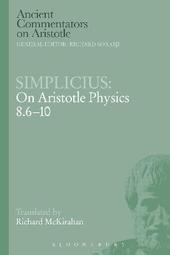
|
Simplicius: On Aristotle Physics 8.6-10
Paperback / softback
Main Details
| Title |
Simplicius: On Aristotle Physics 8.6-10
|
| Authors and Contributors |
By (author) Richard D. McKirahan
|
| Series | Ancient Commentators on Aristotle |
|---|
| Physical Properties |
| Format:Paperback / softback | | Pages:240 | | Dimensions(mm): Height 234,Width 156 |
|
| Category/Genre | Western philosophy - Ancient to c 500 |
|---|
| ISBN/Barcode |
9781780938974
|
| Classifications | Dewey:185 |
|---|
| Audience | | Tertiary Education (US: College) | |
|---|
|
Publishing Details |
| Publisher |
Bloomsbury Publishing PLC
|
| Imprint |
Bloomsbury Academic
|
| Publication Date |
10 April 2014 |
| Publication Country |
United Kingdom
|
Description
Aristotle's Physics is about the causes of motion and culminates in a proof that God is needed as the ultimate cause of motion. Aristotle argues that things in motion need to be moved by something other than themselves - he rejects Plato's self-movers. On pain of regress, there must be an unmoved mover. If this unmoved mover is to cause motion eternally, it needs infinite power. It cannot, then, be a body, since bodies, being of finite size, cannot house infinite power. The unmoved mover is therefore an incorporeal God. Simplicius reveals that his teacher, Ammonius, harmonised Aristotle with Plato to counter Christian charges of pagan disagreement, by making Aristotle's God a cause of beginningless movement, but of beginningless existence of the universe. Eternal existence, not less than eternal motion, calls for an infinite, and hence incorporeal, force. By an irony, this anti-Christian interpretation turned Aristotle's God from a thinker into a certain kind of Creator, and so helped to make Aristotle's God acceptable to St Thomas Aquinas in the thirteenth century. This text provides a translation of Simplicius' commentary on Aristotle's work.
Author Biography
Richard McKirahan is the Edwin Clarence Norton Professor of Classics and Professor of Philosophy at Pomona College, Claremont, California.
|